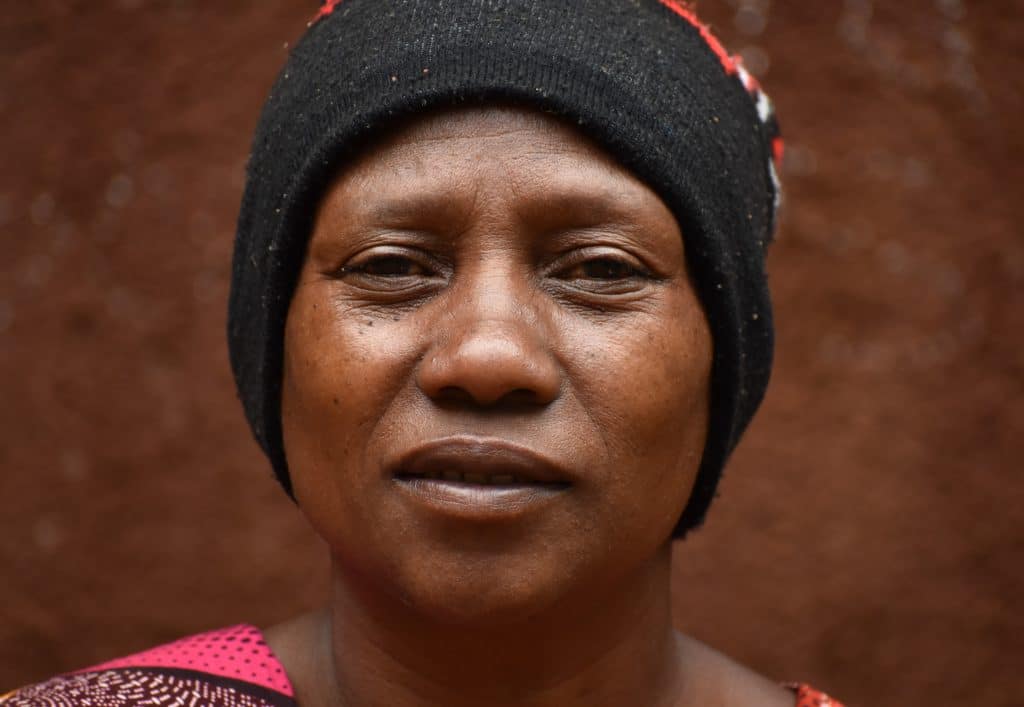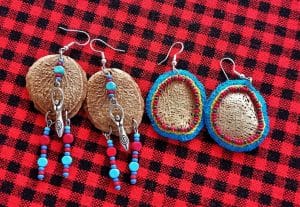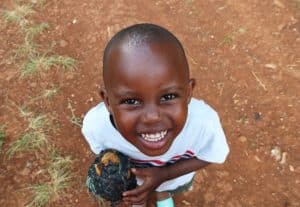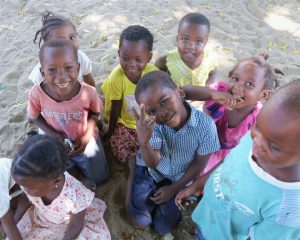I met Rosemary at my friend Digna’s bar, in the village of Shimbwe on the slopes of the Kilimanjaro.
On my travels I always ask women I meet if they had a coming of age ceremony after their first period appeared.
In most places the answer I get is no. Africa is changing faster than I would have hoped. And at the same time, Mother Earth’s blessing is guiding me time and time again to the places where rites of passage from childhood to womanhood are still being celebrated.
Here too, in the village of Shimbwe- my Kilimanjaro home- I’m getting more of the same answers. Even the village bibis- grandmothers- don’t remember any ceremonies or initiations from the time they were young girls. Most women tell me that their mothers didn’t initiate or celebrate their coming of age, and many of them learned about their menstrual cycle from big sisters, girlfriends, and in school. In turn, most of them didn’t teach their own daughters. and so, much like Western society, the sacred tradition is lost.
Still, I keep on asking my questions…
Next to me in Digna’s bar was sitting Jenny, a young woman who was back home from college for the summer vacation, and speaks good English. It was a great opportunity to delve into a conversation that my Swahili still doesn’t allow.

I asked Digna if she had been taught about her menstrual cycle as a young girl.
She said sure!
Her grandmother, the one who taught her the traditional healing wisdom, a wisdom only passed down through the women of the family, taught her everything about becoming a young woman.
And did you teach your daughters?
Of course! And I will also teach my granddaughters!
I was filled with love for this marvelous free spirited woman. She is fortunate that her grandmother was who she was, and so are Digna’s daughters, because she deeply understands what others have forgotten — her role in her dynasty — to pass on the legacy of knowledge and wisdom.

Next to us sits a small quiet woman, concentrated on her afternoon cup of Mbege, the local beer.
I almost didn’t notice her, but something made me turn my attention to her. Some hidden whisper in the wind maybe…
I decided to ask her, almost certain of the usual answer I get in the village:
Can I ask you too? Have you been taught? Were you celebrated?
Yes.
In my tribe we celebrate rites of passage.
A glimpse into a fascinating story opened up for me in that one moment. In our Kilimanjaro Chagga tribe village, lives a woman from a distant tribe…

The Ngoni tribe
Rosemary Ludovick Kinyaiya was born in Songea, southern Tanzania, into the Ngoni tribe.
The Ngoni originate from kwaZulu-Natal in southern Africa. How they came to Tanzania is a fascinating story in itself.
About 2000 years ago, after the rise of power and cruel conquests of the famous King Shaka Zulu, took place “the great scattering”. Many tribes who knew they could not defeat Shaka’s army chose to leave their lands and move away from the danger. The Ngoni tribe separated into parts during the scattering, and part of it settled in southern Tanzania. They brought with them their rich heritage of ceremonies and celebrations, and to this day are known in Tanzania as a tribe that “dances a lot”, meaning they still celebrate the rites of passage and the seasonal celebrations…
Rosemary's story
In Songea, her Ngoni home, she met her husband, a Chagga tribe man from our village of Shimbwe who came there following a job opportunity. Together they moved, married and with little Peter, their first born, to the mountain kingdom.
Rosemary says she loves her life on the mountain.
She left behind the Ngoni customs, the songs and dances long forgotten, but what she remembered, she was willing to share with us…
I was so happy to meet a woman who went through a coming of age ceremony. A few days later, me and my new interpreter Jenny, set out to meet Rosemary in her home.
Smiling timidly, Helena, Rosemary’s young daughter, was moving around us.
Come sit with us, I said, this is your heritage, it’s important.
She sits down embarrassed, listening.
Helena didn’t have a coming of age ceremony. She is a chagga, and we are in Chagga land now. Says Rosemary with a smile.

Rosemary's grandmother
In my tribe, when a girl got her first period, someone around her, a girlfriend, sister, mother or aunt, would go let one of the grandmothers know, and the grandmother would take the girl home for a whole month.
If men or boys lived in the grandmother’s household, they were sent to live temporarily in other houses – it was the sacred time of the women.
During the month her grandmother- bibi- bathed young Rosemary every morning, showed her how to put on the absorbent fabrics, and taught her about the life of women.
Everyday she told her about menstruation, sexuality, about avoiding pregnancy, and also about married life and how to become a wise mother and wife.
Rosemary, called Mama Peter since she became a mother to her first born Peter, doesn’t remember how old she was when all this took place. She is 60 years old, a mother of 7 and a grandmother of 5. Here people don’t hold on to the past, why does it matter anyway?
The initiation
After a month of teachings and seclusion in her bibi’s house, the moment of the initiation ceremony arrives.
Early in the morning, bibi and Rosemary go down to the river deep in the forest, a secret place for women’s initiations. They are joined by girls who have already had their initiation. They come to support, and also to receive some more teachings. As any good teacher knows, repetition is key…
Bibi bathes Rosemary in the water and blesses her. A woman’s blessing is a powerful thing, let alone an woman elder. The blessings of the ancestors are also called upon. A whole tribe stands with her now.
Then she teaches the group of girls more of the secrets of womanhood, about their monthly cycle, their sexuality and more.
Rosemary can remember feeling very happy and proud, and especially being focused on listening and learning all of her bibi’s teachings and wisdom.
The celebration
At noon time, the group returned to the village, where the whole village people were waiting for them- women and men, elders and children.
The celebration begins! Drumming, dancing, good food, and of course, plenty of the local beer. The festivities continued until the next day, everyone celebrated young Rosemary.
Rosemary remembers the gifts… All the family members gave her clothes and money, new shoes and other surprises.
The girl is no more.
A woman is joining the circle
of women of the village
and her name is Rosemary!
New life as a woman
After the initiation, a girl carries herself differently, she says. Just as her bibi taught her.
She behaves like a woman and not like a child. She will dress in long skirts – her sexuality is not for anyone. She will not play with boys as they did in childhood.
This is perhaps the most basic method of avoiding early pregnancies- after a girl is accepted into womanhood and a boy into manhood, girls and boys sleep in separate rooms, and even walk in separate groups on the way to school, church or the shop.
Did she give her daughter Helena a gift when she got her first period?
Helena belongs to the Chagga tribe. No, she didn’t receive a gift. But she taught all her daughters what she learned from her bibi. She remembered all her teachings and applied them, and she is proud of the family she has created with her husband.
She also taught her sons, and will teach her grandsons. About adolescence, about girls, sexuality and health. How to avoid disease, stay loyal to one woman and respect women.
And so the chain is broken.
Rosemary chose to move with her beloved to his tribe, and her children belong to the Chagga tribe. As rites of passage are not celebrated here, her children didn’t go through the initiations.
But Rosemary passed on the essence – the guidance she received from her grandmother. And Helena, her daughter, is sitting with us and listens. Young Jenny is listening too. And I’m writing her story, and you’re reading it. There is always hope for a better future.
Why are rites of passage important?
I believe that our original human living, the tribal way, holds great wisdom for us all. Wisdom that is needed for our wellness and happiness.
In our big life transitions, guidance is crucial.
We are not supposed to figure out by ourselves how to transition into womanhood or manhood. Our elders are supposed to be our life teachers.
How will we know how to build relationships, how to experience fun and respectful sexuality? How to behave in the community? These are things to be learned.
How will a girl know what the menstrual cycle is, what its deep and sacred meanings are, and what to do physically when it arrives?
How will a boy know how to understand his arousing sexuality and his new interest in girls?
In this transition from the world of childhood to adulthood, ritual is the process of sacred transformation. The world of childhood is left behind, and a woman is born, a man was born.
That’s why I share coming of age stories. I hope to inspire all of us to bring back our original human living, our ancient tribal wisdom. As we were all a tribe once.
My thanks and appreciation to Rosemary Ludovick Kinyaiya for sharing her story with us.

Read about more coming of age ceremonies.
More stories from my Kilimanjaro home.
Waiting to hear your thoughts and feelings in the comments!






















